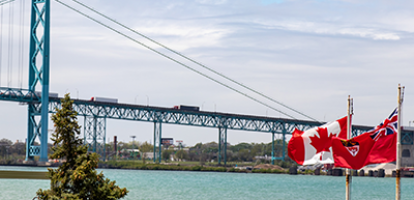From: Jon Johnson
To: Canadians Concerned About Climate Change
Date: March 5, 2020
Re: Combatting Climate Change with Carbon Border Taxes – Good or Bad Idea?
European Commission president Ursula von der Leyen proposes a “carbon border tax” to “avoid carbon leakage.” Bernie Sanders advocates a “carbon intensity fee” (i.e., a carbon border tax) on imports to make sure that “goods sold into the US are not able to undercut domestic manufacturing.”
Many jurisdictions, including Canada, put a cost on carbon emissions through carbon taxes or cap and trade regimes. The objective of this “carbon pricing” is to provide an incentive to producers to avoid such charges by reducing carbon emissions.
But nations that won’t play get an unfair advantage.
An economy that does not price (or tax) carbon generates more carbon emissions, and is therefore attractive to carbon emitters, creating the concept of “carbon leakage.”
Given the common objective to reduce emissions globally, a jurisdiction that imposes no price on emissions is providing an unfair benefit to its producers at the expense of producers in countries that do price carbon. The solution is to offset this benefit by imposing a carbon border tax on products imported from that country.
However, this raises the question of how such taxes fit with the international trading regime established by the WTO.
Each WTO member has undertaken not to increase its tariffs above bound levels except under specified circumstances. The WTO prescribes procedures permitting members to counteract dumping or subsidizing exports (practices considered as “unfair”) by applying antidumping or countervailing duties. However, nothing in the WTO explicitly permits members to impose additional duties on imports from countries that fail to price carbon.
WTO law permits border adjustments (i.e., additional taxes) on imports if the importing country imposes the same taxes on domestic goods. Canada’s carbon pricing legislation lists 22 fuels, each with its own specified charge. These charges apply to imported fuel as well as to fuel sold domestically.
However, border adjustments cannot be applied if the carbon charges are imposed on the producer of the product (such as Canada’s excess emission charges on large industrial emitters) rather than on the product itself.
WTO law provides exceptions for measures necessary to protect human, animal or plant life or health and for conserving exhaustible natural resources. While these exceptions have their limitations, the WTO is not oblivious to environmental concerns. Clean air has been held to be an exhaustible natural resource, and WTO law has evolved over time to accommodate environmental concerns.
A WTO decision setting out conditions upon which carbon border taxes would be covered by an exception could be very helpful. However, this will not occur anytime soon because the WTO dispute settlement process is currently inoperable, since the Appellate Body has no quorum due to an uncooperative US administration.
International co-operation to combat climate change is possible, as the Paris Accord demonstrates. However, the Paris Accord does not impose hard consequences on countries that fail to meet their obligations. A carbon border tax is a hard consequence that could cause real pain to affected producers. Carbon pricing can take many forms, and carbon border taxes should not be imposed without broad consensus on how to compare the effectiveness of different approaches to pricing carbon and agreement on procedures that must be followed.
Absent consensus, individual countries may choose to unilaterally police the climate change policies of other countries and impose carbon border taxes on imports from countries whose climate policies they don’t like.
However, rather than changing their policies, countries whose products are subject to unilaterally imposed carbon border taxes may impose retaliatory tariffs on products from the country imposing the carbon border tax.
Many US trading partners imposed retaliatory tariffs on US products, without WTO permission, when the US unilaterally imposed taxes on imports of steel and aluminum purportedly to protect national security. Aggressive use of carbon border taxes could provoke trade wars that will increase economic uncertainty without advancing the cause of combatting climate change.
Jon Johnson is a former advisor to the Canadian government during NAFTA negotiations and is a Senior Fellow at the C.D. Howe Institute.
To send a comment or leave feedback, email us at blog@cdhowe.org.
The views expressed here are those of the author. The C.D. Howe Institute does not take corporate positions on policy matters.





